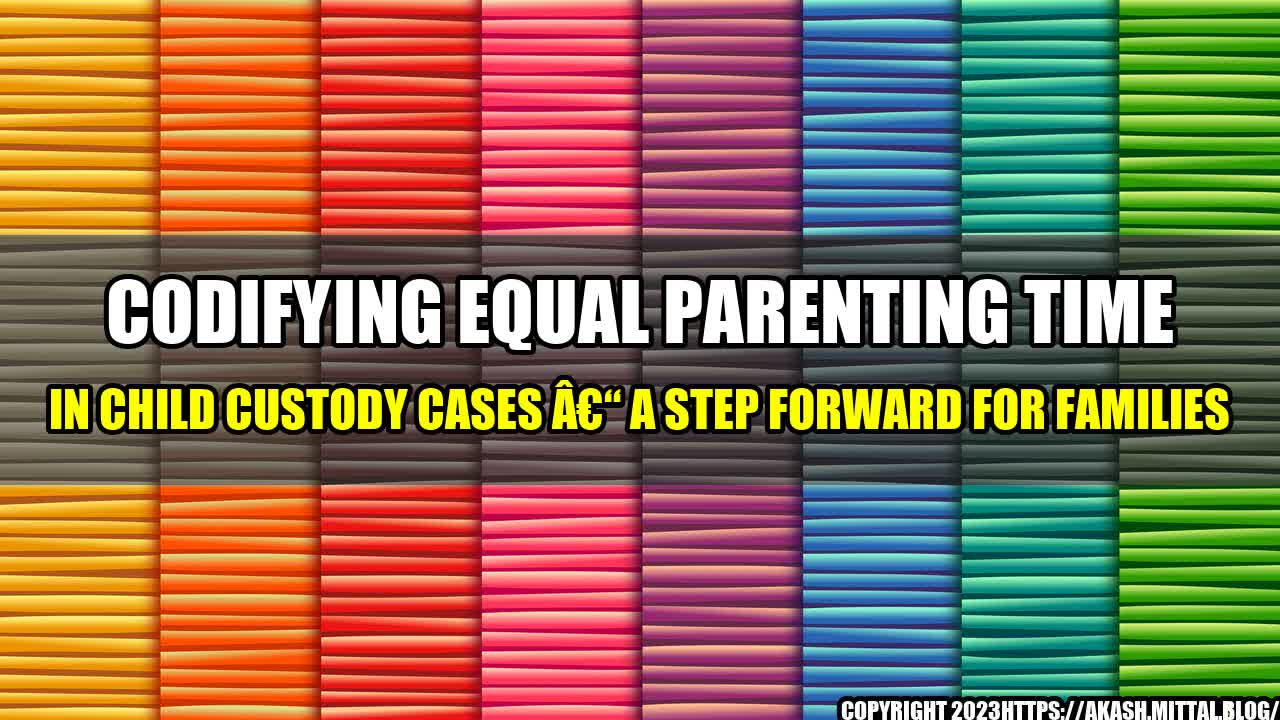Imagine a divorced couple who have two young children together. The court has granted physical custody to the mother, with the father having visitation rights every other weekend. However, the father is deeply involved in his children's lives and wants to spend more time with them. The mother, on the other hand, thinks that the current arrangement is fair and doesn't want to change it.
This is a common scenario in family courts. Despite the growing trend towards shared parenting, many courts still tend to award custody to one parent, usually the mother, and give the other parent limited visitation rights. This often leads to bitter custody battles and long-term damage to the children involved.
Research has shown that children benefit from having both parents actively involved in their lives. According to a study by the American Psychological Association, shared parenting is associated with better outcomes for children in terms of academic performance, mental health, and overall well-being.
Furthermore, states that have implemented equal parenting time laws have seen a decline in custody disputes and a higher level of parental satisfaction. For example, Kentucky passed a law in 2018 that mandates equal parenting time unless there is evidence of abuse or neglect, and since then, the state has seen a 23% decrease in custody litigation.
A
Codifying Equal Parenting Time in Child Custody Cases – A Step Forward for Families
and Case Studies
One of the biggest challenges in family court is convincing the judge to grant equal parenting time. This is especially true for fathers, who often face gender bias and stereotypes that portray them as "weekend dads" or "babysitters."
For example, John and Melissa, a divorced couple from Minnesota, have been fighting for equal parenting time for their two sons for years. Despite John's involvement in the children's lives, the court awarded primary custody to Melissa and gave John only limited visitation rights. The couple had to spend thousands of dollars on legal fees and endured a lot of stress and frustration.
Another example is Emily, a single mother from California. When she filed for divorce from her abusive husband, she was afraid that he would be granted unsupervised visitation with their daughter. However, thanks to California's equal parenting time law, Emily was able to negotiate a parenting plan that allowed her ex-husband to have limited supervised visitation while she retained primary custody.
Practical Tips
If you are a divorcing parent who wants more time with your children, here are some tips to help you achieve equal parenting time:
- Research your state's laws and custody guidelines, and hire a lawyer who specializes in family law.
- Create a detailed parenting plan that outlines your proposed schedule, holidays, vacations, and other important events.
- Be willing to compromise and negotiate with your ex-spouse, but also stand firm on your fundamental rights as a parent.
- Attend mediation sessions and other alternative dispute resolution forums to avoid costly and time-consuming court battles.
- Stay involved in your children's lives and demonstrate to the court that you are a loving, responsible, and capable parent.
Conclusion
In conclusion, codifying equal parenting time in child custody cases is a positive step forward for families. This new law will help to ensure that children have the benefit of both parents' involvement in their lives, while also reducing the stress, costs, and adversarial nature of custody disputes. Equal parenting time not only benefits children, but also parents, who will have a greater level of satisfaction and empowerment when it comes to raising their children. It is our hope that more states will follow Kentucky's lead and enact laws that codify equal parenting time as the default option in child custody cases.
- Equal parenting time benefits children in terms of academic performance, mental health, and well-being.
- States with equal parenting time laws have seen a decrease in custody litigation and an increase in parental satisfaction.
- To achieve equal parenting time, divorcing parents should research their state's laws, create a detailed parenting plan, be willing to negotiate, attend mediation, and stay involved in their children's lives.

Curated by Team Akash.Mittal.Blog
Share on Twitter Share on LinkedIn